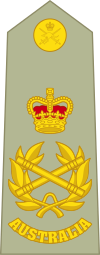Field Marshal (Australia)
| Field marshal |
|
|---|---|

The FM insignia of St. Edward's Crown mounted above two crossed batons that are circled by a wreath of oak leaves.
|
|

Australia's first appointed field marshal, LTGEN W.R. Birdwood near Hill 60, Gallipoli. Photograph by C.E.W. Bean, October 1915.
|
|
| Country |
|
| Service branch |
|
| Abbreviation | FM |
| Rank | Field Marshal |
| NATO rank | OF-10 |
| Non-NATO rank | O-11 |
| Formation | 1925 |
| Next higher rank | Governors of the Australian states (ceremonial) |
| Next lower rank | General |
| Equivalent ranks | |
Field marshal is the highest rank of the Australian Army and was created as a direct equivalent of the British military rank of field marshal. It is a five-star rank, equivalent to the ranks in the other armed services of admiral of the fleet in the Royal Australian Navy, and marshal in the Royal Australian Air Force. The subordinate army rank is general.
Field Marshal Sir William Birdwood (later created The 1st Baron Birdwood) was a British Army officer who commanded the First Australian Imperial Force (1st AIF) in World War I. As such, he was made a general in the AIF in 1917, and in the Australian Army in 1920. Despite his British origins, "Birdy", as he was known to the Australian soldiers, was a popular and respected commander and his promotion was seen as reward for his effective command of the AIF. When he was promoted to the rank of field marshal in the British Army in 1925, Birdwood was also made a field marshal in the Australian Army. His baton is kept in the Australian War Memorial and is on display in the World War One exhibition.
Sir Thomas Blamey was the first and is the only Australian-born field marshal. He was promoted to the rank on the insistence of the then Australian Prime Minister Sir Robert Menzies in 1951. Blamey served in World War I in the First Australian Imperial Force (AIF), from the horrors of trench warfare at the ANZAC positions at Gallipoli to duties as chief of staff to Lieutenant General Sir John Monash, Commander of the Australian Corps in France and Belgium. Blamey attained the rank of brigadier general by the war's end. During the inter-war years he served as chief commissioner of the Victoria Police. During the 1920s and 1930s he expressed public concern over the state of the Australian Military Forces due to financial restrictions brought about by the Great Depression.
...
Wikipedia
